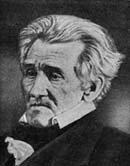Andrew Jackson Biography

Andrew Jackson
Birthplace: Waxhaw, S.C.
Andrew Jackson was born on March 15, 1767, in what is now generally agreed to be Waxhaw, S.C. After a turbulent boyhood as an orphan and a British prisoner, he moved west to Tennessee, where he soon qualified for law practice but found time for such frontier pleasures as horse racing, cockfighting, and dueling. His marriage to Rachel Donelson Robards in 1791 was complicated by subsequent legal uncertainties about the status of her divorce. During the 1790s, Jackson served in the Tennessee Constitutional Convention, the United States House of Representatives and Senate, and on the Tennessee Supreme Court.
After some years as a country gentleman, living at the Hermitage near Nashville, Jackson in 1812 was given command of Tennessee troops sent against the Creeks. He defeated the Indians at Horseshoe Bend in 1814; subsequently he became a major general and won the Battle of New Orleans over veteran British troops, though after the treaty of peace had been signed at Ghent. In 1818, Jackson invaded Florida, captured Pensacola, and hanged two Englishmen named Arbuthnot and Ambrister, creating an international incident. A presidential boom began for him in 1821, and to foster it, he returned to the Senate (1823–25). Though he won a plurality of electoral votes in 1824, he lost in the House when Clay threw his strength to Adams. Four years later, he easily defeated Adams. Jackson, the first president to come from humble origins, built his reputation as a populist and a defender of the common man over the political elite.
As president, Jackson greatly expanded the power and prestige of the presidential office and carried through an unprecedented program of domestic reform, vetoing the bill to extend the United States Bank, moving toward a hard-money currency policy, and checking the program of federal internal improvements. He also vindicated federal authority against South Carolina with its doctrine of nullification and against France on the question of debts. The support given his policies by the workingmen of the East as well as by the farmers of the East, West, and South resulted in his triumphant reelection in 1832 over Clay.
After watching the inauguration of his handpicked successor, Martin Van Buren, Jackson retired to the Hermitage, where he maintained a lively interest in national affairs until his death on June 8, 1845.
See also Encyclopedia: Andrew Jackson.
Died: 6/8/1845| John Quincy Adams | Biographies of the Presidents | Martin Van Buren |







